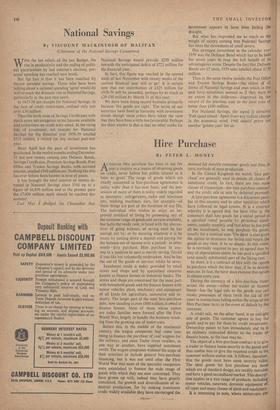National Savings
Writ the tax reliefs of the last Budget, the rise in productivity and the ending of politi- cal uncertainties by last autumn's election, per- sonal spending has reached new levels.
But the fact is that it has been matched by record personal savings. Those who have been talking about a national spending 'spree' would do well to mark the dramatic rise in National Savings, particularly in the past two years. In 1957-58 net receipts for National Savings, in the face of credit restrictions, realised only just over £36 million.
Then the tenth issue of Savings Certificates with much more advantageous terms became available and restrictions on credit were cased. In the rising tide of investment, net receipts for National Savings for the financial year 1958-59 totalled £325 million, a record for any normal post-war year.
Since April last the pace of investment has quickened. In the twelve months ending December 31 last new money coming into Defence Bonds, Savings Certificates, Premium Savings Bonds, Post Office and Trustee Savings Banks, with accrued interest, totalled £398 million net. Nothing like this has ever before been known in time of peace.
It has brought the total amount of money in- vested in National Savings since 1916 up to a figure of £6,850 million and at the present pace the £7,000 million mark should be reached this summer.'
Last May I pledged the Chancellor that National Savings would provide £250 million towards the anticipated deficit of £721 million for the financial year.
In fact, this figure was reached in the second week of last November with twenty weeks of the current financial year still to go! It is certain now that our contribution of £325 million for 1958-59 will be exceeded, perhaps by as much as £20-£30 million by March 31 of this year.
We have been doing record business primarily because 'the goods are right.' The terms of our securities have been in harmony with investment trends though some critics have taken the view that they have been a little too favourable. Perhaps the short answer to that is that no other outlet for investment appears to have been feeling the draught.
But what has impressed me as much as the weight of money coming into National Savings has been the shrewdness of small savers.
Our strongest investment in the calendar year 1959 was the Defence Bond which has to be held for seven years to reap the full benefit of its advantageous terms. Despite the fact that Defence Bonds are £5 units, 1959 sales totalled about £150 million.
Then in the same twelve months the Post Office and Trustee Savings Banks—the oldest of all forms of National Savings and ones which in the past have sometimes seemed as if they were to an extent in the doldrums—improved on the record of the previous year to the joint tune of better than £100 million.
For National Savings, the signal is certainly 'Full speed ahead.' Apart from any radical change in the economic wind, 1960 should prove yet another 'golden year' for us.






































 Previous page
Previous page